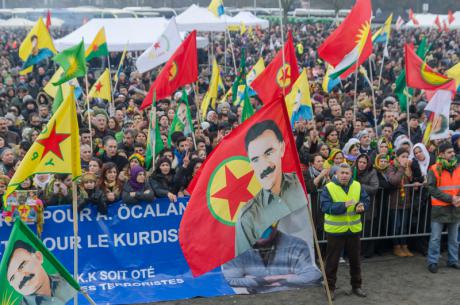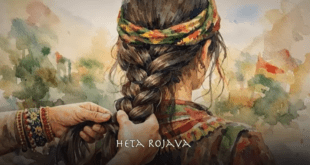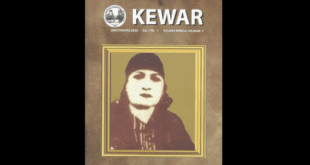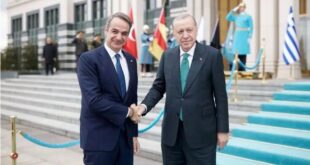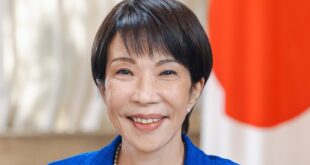Photo: Kurds demonstrate in Strasbourg calling for Ocalan’s release, February 2015. Demotix/ Jonathan Rae. All rights reserved.
Past experience suggests that this unclarity about the peace process may once again open the door for brutal conflict.
Turkey and the Kurds share the aim of ending their long-standing conflict. So what of the so-called peace process between the Turkish state and the PKK, especially their imprisoned leader Abdullah Ocalan? And what is the potential role of Kurdish diaspora groups in ‘peace-making’, ‘peacebuilding’ and ‘reconciliation’ processes with Turkey?
I have been exploring the experiences of Kurdish individuals and families in the diaspora, specifically looking at involvement in homeland politics, conflict and peace between April 2014 and May 2015 for my research, facilitating five focus groups and securing interviews with those from different parts of Kurdistan now living in the UK and Germany. In total, my research involved 60 Kurdish adults, of whom 29 were women, and 31 were men, building on work on the Kurdish diaspora in the UK and Germany since 2008.
Middle East conflict and peace process
I want to start by arguing that there is not actually any real peace process in Turkey. The outcome of this research shows that the aim of negotiations – for both AKP and the Kurdish parties, especially the Kurdistan Workers’ Party (PKK) – is actually to monopolise power and violence.
This ‘game’ is likely to further deepen divisions between Turks and Kurds, and may even open the door for further escalation of violent conflict. Something like this was seen on 6-7 October 2014 in almost all the Kurdish-populated cities in Turkey when around 50 people lost their lives.
Especially for the AKP government, these so-called negotiations are not about risk-taking to make peace – but about risk-avoidance to maintain the status quo, and so to maintain the current actors’ grasp on power. But without taking substantial risks, including the risk of losing power, it is almost impossible to broker peace.
Before analysing the current conditions in the Middle East and Turkey, and the role of diaspora communities in more depth, I would like to underline the fact that peace negotiations are never easy. Getting started is often – usually – the most difficult thing to do. Conflict will either continue, or only be temporarily and conditionally stopped. Any peace process is like a game, a theatre. There are many players, actors – from different sides – who do not trust each other. Different sides have different agendas. Some protagonists may benefit directly from the war, and can easily choose to destroy any possible peace process. For example, the 50,000 men currently employed by the Turkish state as village guards have no incentive to support peace, since peace will probably mean that they will lose their family’s livelihood.
Moreover, with Kurdish populations living in Syria, Iraq and Iran, as well as in the diaspora and Turkey, one cannot separate the Kurdish and Turkish ‘peace process’ from ongoing conflicts and wars in the neighbouring countries. Many of the Kurds I have interviewed believe that for any successful and permanent peace, Kurds living in all of these places, including the diaspora, must be involved in any peace process.
In the Middle East and Turkey, especially in the last 35 years, there has never been a day without war and violence. The most recent conflict – which started in March 2011 in Syria, and has included Iraq from 2014 – has cost around 500 thousand lives and created millions of homeless people and refugees. It is not surprising that all of these wars have disproportionately affected the Kurds.
In Syria and Iraq now, there is no rule of law, no consistent authority and, effectively, no state. The Iranian and Turkish states both have their own agendas. They are both aiming for ‘big brother’ style leadership of the Middle East using, respectively Shia / Sunni proxies. Neither wants to see Kurds united: both have been accustomed to using warring Kurdish factions as buffer armies since the 16th century. When Kurds try to distance themselves from this situation, and connect with the international community, then Iran and Turkey try new ways to weaken and keep Kurds divided.
Most recently, at the same time as Turkey was supporting ISIS against Kurds, Iran was directly helping and supporting Shia militias fighting in Iraq against both Kurds and ISIS. Both countries are happy to see Kurds given a bloody nose and divided. There is a famous phrase that “if you find two brothers fighting, do not try to separate them, otherwise they will both turn on you.” In the Kurdish case, other countries do not just leave Kurdish factions to fight with each other, they also pour petrol on the fighting to make sure that fighting continues.
Talks about talks
So, it is difficult to talk about any real peace process between Turks and Kurds. There do seem to have been some talks about possible peace-talks. These limited talks have only been between two political parties or groups (AKP and PKK), rather than involving all the different internal and international power-holders. However, these talks about talks are not new. Around two decades ago, in 1993, President Ozal tried to negotiate with Ocalan through various mediators. The failure of this initiative opened the door for the very brutal conflicts of the 1990s. Then in 1997, Prime Minister Erbakan made another unsuccessful attempt – one of the results of which was a military coup. In 2009, the ‘Oslo process’ involved Turkish state representatives, especially the Turkish National Intelligence Service and the PKK negotiating secretly with the help of diaspora representatives.
However this 2009 attempt by the AKP government for peace with Kurds did not continue. Both sides, the government and the PKK, blamed each other for the collapse of the talks in 2011, when the process was made public. The broken promises and loss of hope after Oslo resulted again in some of the bloodiest conflicts between Turkish state forces and the PKK since before the 1999 Abdullah Ocalan arrest. The Uludere massacre took place in December 2011, when 34 Kurdish civilians were killed by the Turkish military. Following this, Ocalan’s meetings with his lawyers and visitors were cancelled and PKK prisoners in Turkey took part in lengthy hunger strikes at the end of 2012.
During this crisis I carried out fieldwork research in Germany and met and talked with Sakine Cansiz about the conflict and the poor prospects for peace just a few weeks before she and other two female Kurdish political activists were assassinated in Paris (9 January 2013). The murderer’s links with the Turkish Intelligence Service (MIT) have been established. Despite a bloody war, 67 days of hunger strike and the Paris assassinations; Newroz 2013 was seen as another step towards peace between Kurds and Turkey when Ocalan’s ceasefire message was read during the Newroz (New Year) celebrations in Diyarbakir. The PKK and Ocalan openly declared that ‘Peace Process’ negotiations were going on. However, the AKP government claimed for a long time that it was not the government but the state that was in contact with Ocalan and other Kurdish political representatives – thereby trying to protect the AKP from any damage from this process. They were avoiding, rather than taking, any risks.
Six years after the 2009 Oslo talks there has not been much in the way of substantive developments; except for several talks between Ocalan and some key players, including some Kurdish MPs, the Turkish Intelligence Service and some AKP members. Erdogan has avoided, at least openly, either being part of the process or working to move the process on.
For any successful peace negotiations, the different parties must work together and be prepared to take risks to solve the dispute. In contrast, in the Turkish and Kurdish so-called peace process many political and societal power holders have not been involved. Key actors within different civil societies and the various relevant political parties do not know the details of the negotiations between the imprisoned Kurdish leader and the AKP or state representatives. There is no clarity about the peace talks themselves, the possible reconciliation process, and possible new institutions in the formation of a potentially decentralised Turkish state.
Past experience suggests that this may open the door for brutal conflict. Even if a peace process was successfully developing between the PKK and AKP, the exclusion of the other factions is likely to increase the possibilities of conflict. For example, Kurdish Hezbollah could turn their guns onto the Turkish state, saying that they do not recognise any peace process, and that they want to fight for an independent Kurdish or Islamic state, as pursued by Hamas. Already, Turkish nationalists and former members of the Turkish military do not recognise the current process and may support a bloody war. Since bad and good can easily, and very quickly, swap sides in Middle East politics, it is important that any peace process should include all main actors, and factions.
Statelessness, diaspora, nationalism and democracy
The underlying concern is how to work towards successful negotiations for peace, including stability post-conflict, with the help of diasporas. One can easily observe deep differences between and within diasporic communities. There is a strong emotional connection between Kurdish diaspora communities and society in Kurdish regional homelands. Just like Kurdish homeland society, diasporas are not a unitary or homogenous entity.
War and conflict over the past thirty years have forced hundreds of thousands of stateless Kurds to flee their homelands in Turkey and other countries in the Middle East in an attempt to secure safety outside of the region.
It can be argued that statelessness, diaspora and nationalism are strongly connected in so far as statelessness and diaspora can be seen to feed nationalism. Since Kurds have no ‘unitary’ religious or linguistic identity, many Kurds have claimed that the only way forward is to become much more nationalistic. From this perspective, unity through nationalism is the only way to end Kurdish statelessness and to make a stable peace.
Many Kurds believe that Kurdish people, both as individuals and as a community, have not been ‘strong enough’ nationalists, since they have not been successful at establishing their own state. The weak nationalism of stateless people, including Kurds, has been part of academic debate in recent years. For example, Ismail Besikci, a well-known Turkish academic who has researched Kurdish issues for decades, has asserted that:
Kurds are not good enough nationalists. They should not be as democratic as they are today. It’s too much. It is not Kurds’ business to make Turkey a more democratic country.
Abdullah Ocalan, the leader of the Kurdistan Workers’ Party (PKK), who has been imprisoned by Turkey since 1999, has also called on all Kurdish people around the world to unite, and to show resistance against their enemies. Kurds who have left the various imagined homelands of Kurdistan to live in diasporas, often take such calls for national solidarity especially seriously. The ISIS attack on Kobane, which has cost thousands of lives and caused suffering to hundreds of thousands of people, is the first time in history that Kurds from different parts of the world have joined together to fight for the same cause. These efforts demonstrate a significant shift in Kurdish nationalism: from localized and weak nationalism towards a collective, stronger form of nationalism with the help of diaspora mobilization.
However, some other Kurds argue against stronger nationalism, and instead believe that Kurds need to be more democratic than they are currently. When Abbas Vali, another well-known Kurdish academic, commented on my recent presentation of Besikci’s statement, he said that, “I have to fundamentally disagree with Besikci. Kurds are not democratic enough.” Kurds who want to promote a more advanced form of democracy are especially concerned about the rights of women and other powerless groups. They even want to champion the right to be heard for those people who hold political views in direct opposition to their own.
Because of long years under the assimilationist policies of the Turkish state, then until recently many Kurds have felt ashamed of their cultural identity. Many Kurds hid their Kurdishness and Kurdish roots. However, with the recent conflict in the Middle East and, especially, the victorious fighting in Kobane, many Kurds are now becoming increasingly proud of their Kurdishness. Linked to this, there is increasing Kurdish nationalism. As Kurds are still an underdog minority, this nationalism is developing into an ‘aggressive’ form which has even been described by Bozarlan as ‘narcissistic nationalism’.
Kurdish diaspora mobilization for the homeland
Members of the Kurdish diaspora have for many years tried to remove the Kurdistan Workers’ Party (PKK) from the European Union’s list of designated terrorist groups. Freedom for Ocalan is another key aim for the Kurdish national diaspora movement. All of these movements are organised under the banner of the Kurdish National Congress (KNC). This was established on 24 May 1999, just a few months after Ocalan was arrested. Underlining the importance of the diaspora communities the KNC is based in Brussels. This is a temporary arrangement which will last until Kurds have full independence, or at least, substantive autonomy.
Under the KNC banner, Kurdish transnational political and protest movements in Europe have made the world aware of the effects of ISIS attacks against Kurds in Shengal in Iraq, as well as in Kobane, Syria. As part of my ethnographic research, I was told that several hundred young Kurdish men and women have travelled from London and Berlin to fight, and help the Kurds in Turkey and Syria. Some of these people are well-educated or work in well-paid professions.
People from the diaspora who cannot go to fight themselves, instead organize fundraising events and take part in lobbying activities and demonstrations with the aim of persuading British and European politicians to help the Kurdish movements in Turkey, Iraq, Syria and Iran. In September and October 2014, some London-based Kurds even went on hunger strike for the Kurdish cause. Benedict Anderson may be wrong when he claims that members of diaspora communities try to influence what is going on in their homeland without being physically involved in destructive conflicts.
Kurds are no longer just a local tribal group, operating through kinship networks. The Kurdish lobby in the diaspora may not be as strong as that for Armenians and Jews, but they are moving in that direction. Millions of Kurds and their supporters can, and do, take to the streets of Istanbul, Berlin, London, Paris, New York and Brussels, whenever there is an issue of concern. They also have increasingly strong and close relationships with the governments of their new host countries. For example, Kurds regularly use facilities within the UK parliament for meetings and political discussions, and several MPs and Lords usually input favourably. These increasing links should not be underestimated.
As we have seen, diaspora communities can easily become a driving engine for homeland politics, nationalist movements, and even armed conflict in the original homeland. They can also become an agent of change towards peace. As discussed above, this was the case for the peace process between the PKK and Turkish state representatives, especially the Turkish National Intelligence Service. In 2009, initial negotiations were brokered with the help of diaspora representatives, in the so-called ‘Oslo Process.’ This example demonstrates that the Kurdish stateless diaspora has already been an active, influential actor in policies affecting its homeland. As one of my interviewees said:
If there is going to be any peace with Turkey, it will be down to the diaspora. And that’s true for conflict too. We are becoming as strong as the Armenian and Jewish diaspora. Assimilated Kurds in Turkey cannot make peace – or war – without us. We [diaspora Kurds] have suffered. And we [diaspora] will be a part of the decision-making process, if there are going to be any decisions.
Millions of people have suffered and moved to different diasporas because of the conflict. Many of them have very little trust in the on-going so-called ‘peace process’. All of this makes any talks and the peace process itself very fragile. Many of my interviewees do not trust the Turkish state, especially the current Erdogan-led government, to make peace. Another of my interviewees explained:
Of course we [diaspora Kurds] want peace. Who would not want peace? I have lived in three different diasporas in the last 30 years:in Germany, in France and now in the UK. I haven’t seen my hometown or my relatives in Turkey since the 1980s. My land was occupied by the village guards. Peace may help people like me to end this misery and to have their land and their home back. But Turkey is not serious about making peace. Erdogan is just playing with us. He needs Kurdish votes and he has used us to stay in power since 2002. He has not made any legal changes in favour of Kurds in his last 13 years in power. He is not a friend of Kurds. We [Kurds] have to think beyond any national borders to help each other. We cannot trust others to help us to make peace; we should create our own state and pull down all the borders that divide us.
The imprisoned Kurdish leader, Ocalan, understands what a potentially important role diaspora communities have. He has repeatedly asked the diaspora to contribute to the development of the peace process both by organising discussions and other events, and also to involve European institutions and governments in these events. With this in mind, several conferences (May and December 2013, December 2014) were organised in Brussels by the Kurdish National Congress in the Diaspora (KNC). These meetings have shown how Kurds feel they cannot trust the Turkish state to engage in any real peace process, and that they realise they must become just as good at playing political games as that state.
At the 13th General Meeting of the KNC, held in Brussels on 25-26 May 2013, it was stated that Kurds have the right to live and create their own destiny in their own land as a Kurdish nation, and:
Democratisation of [the] Middle East can be achieved through the recognition of Kurdish identity and Kurdistan as a nation… On these grounds Kirkuk and other parts of [the] Kurdish region[s] that were taken [by Turkey, Iraq, Syria and Iran] have to be included again in the map of Kurdistan, and these countries have to show their respect for the map of Kurdistan and its territory.
As we see from this explanation, there are no signs that Kurds, as represented by the PKK and KNC, have dropped their claim of creating a unitary Kurdish state.
Are Kurds learning to play the system?
More tactically, and perhaps more realistically, many Kurdish nationalists have temporarily postponed their aim to create a Kurdish state in Turkey, as they focus on state-making in Syria and Iraq. As long as the fight continues in Iraq and Syria, the most radical Kurds can consolidate their increasingly radical members around that struggle. As Jok says for the South Sudanese case: “nations don’t just happen – they have to be planned, forged and crafted.” Many Kurds in diaspora and also in Turkey are aware that the processes and techniques for state making are not easy and may take a long time. For example, the Mayor of Kobane acknowledged that “we [Kurds] are not professional [yet] when it comes to independence.” Cemil Bayık, one of the founders and leaders of the outlawed PKK, has said that although currently there is no situation that requires an armed struggle against Turkey, “this does not mean we will lay down our weapons. When the chaos that is engulfing the Middle East is taken into consideration, disarming is not possible.”
Many of my interviewees believe that the sort of democratic autonomous system that Ocalan and many Kurdish nationalists currently support for Turkey would not only give them time but also allow some of the necessary preparations for a future unitary Kurdish state. Kurds already practice their own legal system for business, family and even criminal cases as a de facto, as part of their practical resistance against the Turkish state and institutions of the state and also part of Kurdish state building project in Turkey unofficially. This practice has been re-developed and introduced by the PKK for Kurdish people.
The Turkish President Recep Tayyip Erdogan has also pointed out in many speeches how different Kurdish power-holders, and especially diasporas, play a crucial role in the ongoing conflict and its resolution. The Kurdish diaspora is therefore recognized as an important influencing factor by both sides of the conflict.
To conclude: the existing peace negotiations between Turkey and Kurds are not balanced. Messages from Ocalan about the negotiations are carried by a few selected Kurdish political party members. I understand that any peace process should be limited to start with, with only a few actual actors, but there seems to have been no substantive process over the last six years.
As discussed above, Kurdish diasporas have followed a ‘strong’ and even ‘aggressive’ nationalism in recent years. They have actively contributed both to the ongoing conflict and to peace. This dual role may be an important barrier for Kurdish leaders to overcome if they are going to make any peace.
Source: https://www.opendemocracy.net/latif-tas/what-kind-of-peace-case-of-turkish-and-kurdish-peace-process
 Infowelat Enformasyon Ji Bo Welat
Infowelat Enformasyon Ji Bo Welat
